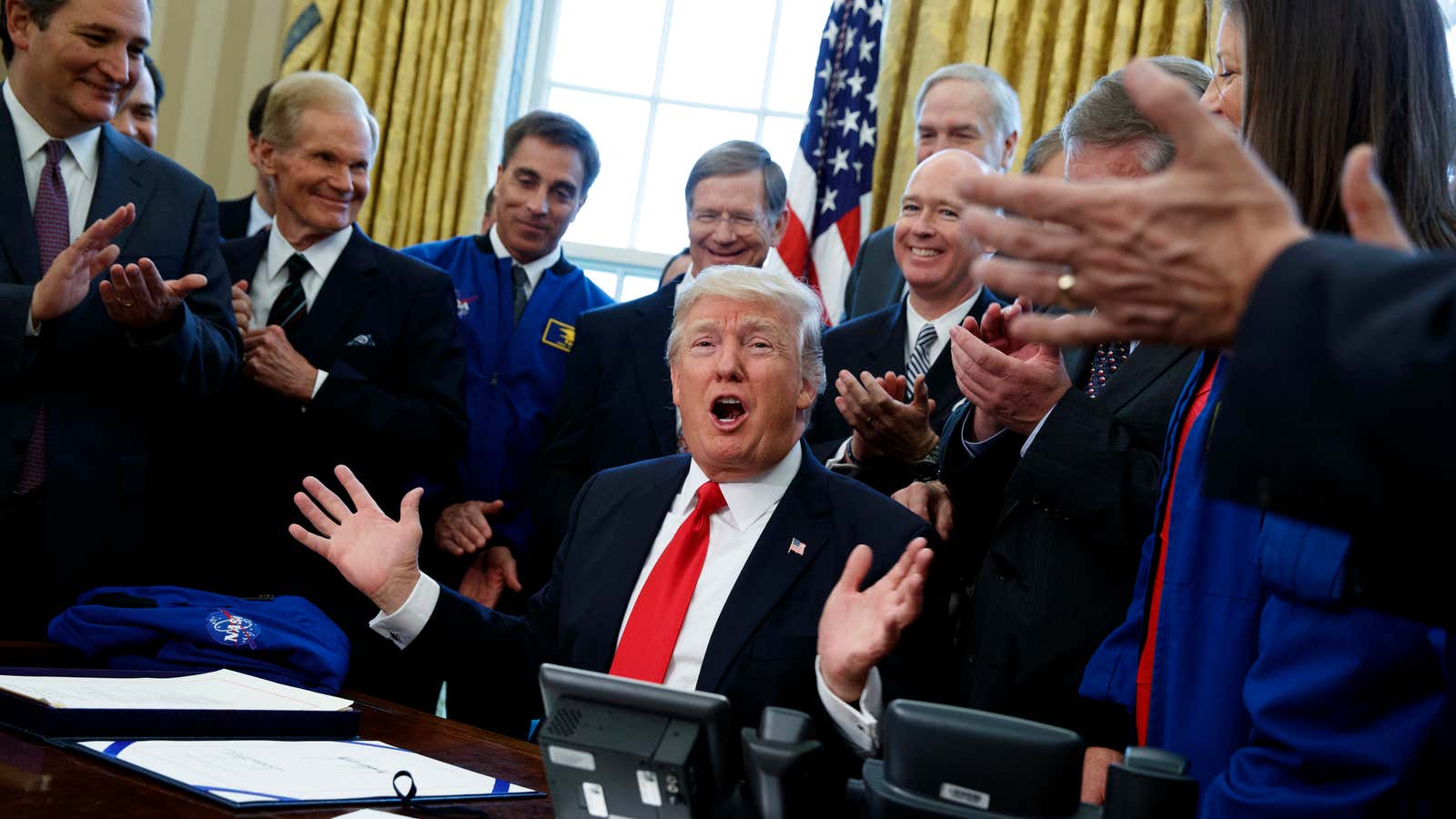At a meeting of National Space Council intended to transfer space responsibilities from military to civilian hands, president Donald Trump surprised attendees by ordering the top US military officer to launch a new branch of the military in space.
While the creation of a Space Force has been debated for several years, the move has been opposed by the military, which has instead begun restructuring the Air Force Space Command to better address threats in space.
Trump up-ended that policy in rambling opening remarks, instructing Marine General Joseph Dunford, the chairman of the joint chiefs of staff, to create the Space Force. The service would be presumably be responsible for the extensive array of surveillance and communication satellites operated by the US Armed Forces, and more controversially for potential anti-satellite weapons and deterrence.
It’s not clear whether or when the Space Force will be created. The decision was not mentioned during a pre-meeting briefing for reporters by Scott Pace, the executive secretary of the space council, or in fact sheets shared with the media. The text of the directive signed by the president at the conclusion of his remarks did not include any mention of the Space Force.
Several hours after the meeting, Pentagon spokesperson Dana White released a statement saying that “we understand the President’s guidance. Our Policy Board will begin working on this issue, which has implications for intelligence operations for the Air Force, Army, Marines and Navy. Working with Congress, this will be a deliberate process with a great deal of input from multiple stakeholders.”
“It is not enough to have an American presence in space, we must have American dominance in space,” Trump said. “We have the Air Force and we’re going to have the Space Force. Separate but equal.”
A Space Force would also need congressional authorization, which may be hard to get. Senator Bill Nelson, a Florida Democrat who has deep influence over space policy responded to the news by tweeting that “generals tell me they don’t want [the Space Force]. Thankfully the president can’t do it without Congress because now is NOT the time to rip the Air Force apart. Too many important missions at stake.”
The meeting convened to promote efforts to streamline the regulations around commercial space activities, from earth imaging to communications satellites to rocket launches. The directive signed by Trump was previewed by vice president Mike Pence in April, and transitions the responsibility for collecting and sharing data about space traffic and debris from the Department of Defense to the Department of Commerce.
“The primary effect is going to be hopefully more timely and rapid access to information,” Pace told reporters before the meeting. “What we hope to do is have a more user-friendly approach…we hope to see people get more rapid information on when they can launch, more flexibility on their launch windows going up, [and to] see satellites having to maneuver less often because of potential collision risk.”
Pace said changes are “not going to happen overnight.”
“It could end up being the most impactful space policy decision this decade, but we won’t know for a decade or more,” Brian Weeden, a space security analyst, said of the space traffic management initiative. He compared it to when President Bill Clinton’s administration stopped intentionally degrading global positioning signals used by civilians, which would eventually enable technologies that give everyone with a smartphone the ability to pinpoint their location.
The move builds on the Trump administration’s push to increase commercialization of space, with Trump praising efforts by moguls like Elon Musk and Jeff Bezos to build rockets and increase human activity in space. Today’s decision is partly inspired by the ambitions of Musk’s SpaceX, as well as companies like OneWeb and LeoSat, to launch huge satellite constellations that will provide broadband connectivity from space.
“Rich guys seem to like rockets,” Trump said. “As long as it’s an American rich person that’s good. If you beat us to Mars, we’ll be very happy, and you’ll be even more famous. We’ll save a lot of money and take the credit for it.”
New NASA administrator Jim Bridenstine has outlined a strategy for returning to the moon that is based on working with private companies, akin to the partnerships that helped make Musk’s rocket company SpaceX the leading commercial rocket provider while creating cheaper access to the International Space Station for the government.
